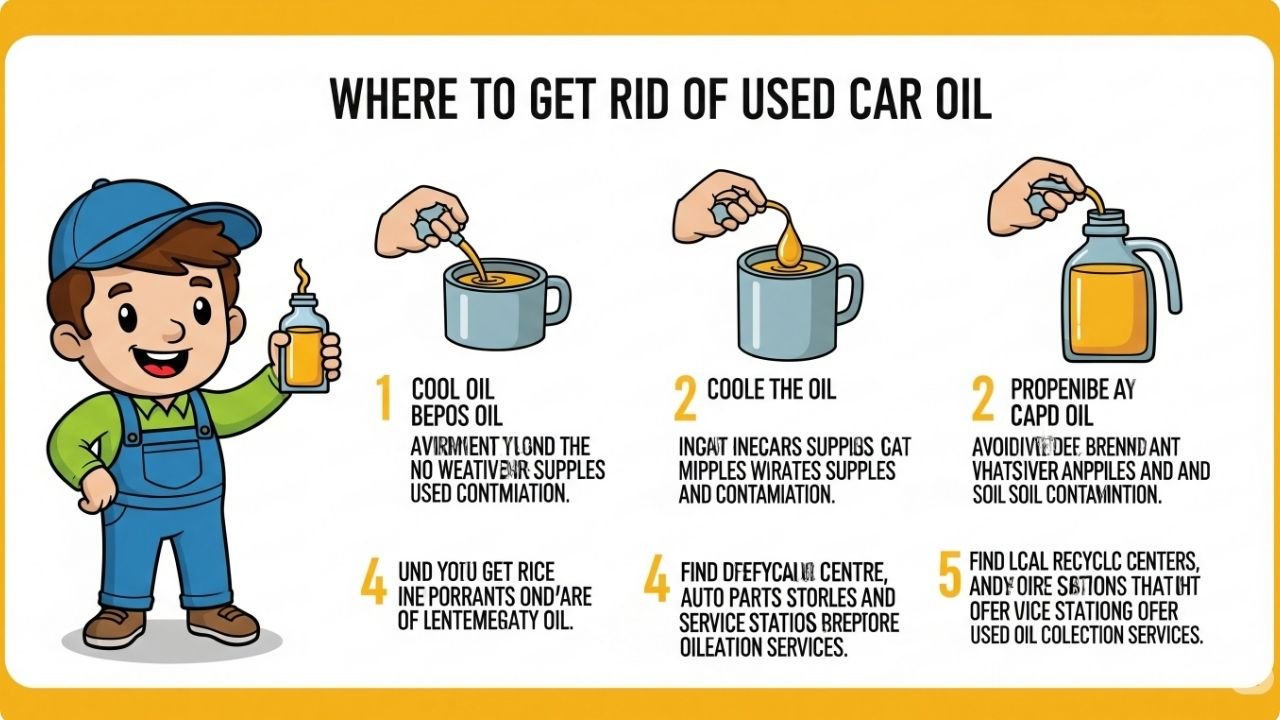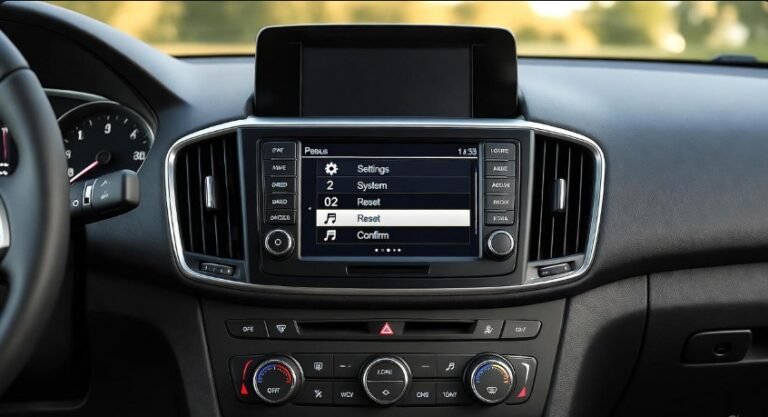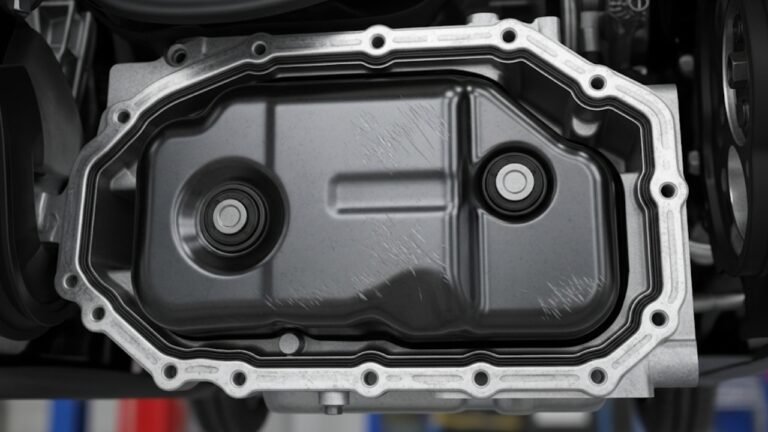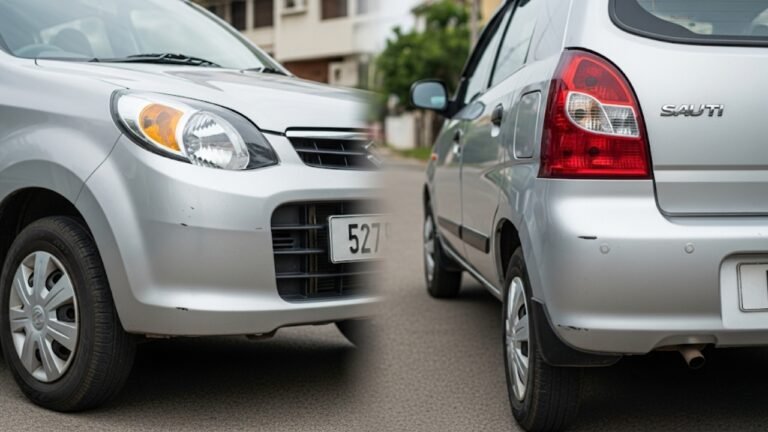Where to Get Rid of Used Car Oil

If you’ve ever changed your car’s oil yourself, you’ve likely found yourself staring at a container full of dark, dirty used car oil and thought, “Now what?”
You’re not alone.
Most DIY car owners hit this moment. It’s tempting to pour it down the drain or toss it in the trash, but doing that can wreck the environment — and cost you a fine.
In this guide, I’ll walk you through exactly where to get rid of used car oil, and how to do it the right way. I’ve messed this up in the past, so I’m not judging — just helping. Think of this like advice from your gearhead neighbor who finally figured it out after years of trial and error.
We’ll go step-by-step, using real-life tips, clear instructions, and stories to make it simple. Whether you’re in a city or small town, you’ll know exactly what to do next.
Let’s get into it.
Why It’s a Big Deal: The Dirty Truth About Used Oil
Used motor oil isn’t just greasy — it’s toxic. One gallon of improperly dumped oil can pollute a million gallons of water. That’s a whole lake. I once read that and couldn’t believe it, but it stuck with me. It’s like one drop turning your whole coffee bitter.
Here’s what’s inside used oil:
- Heavy metals like lead, zinc, and cadmium
- Burned additives and detergents
- Sludge particles from engine wear
- Carbon deposits and water contamination
Dumping this stuff on the ground or down the drain doesn’t just kill plants — it seeps into the water table and hurts people, animals, and ecosystems. It can also cause fires, health hazards, and legal trouble.
Moral of the story? Be the good guy. Handle your used oil like it matters — because it really does.
Step One: Collect the Oil Properly
Before you even think about where to drop it off, you need to collect your used car oil the right way. A leaky mess in the trunk of your car isn’t doing the planet (or your carpets) any favors.
Here’s how I do it:
- Use a drain pan that seals. You can get them cheap at any auto store.
- After draining, funnel the oil into a sturdy, clean container with a tight lid. A plastic oil jug works great. Just don’t mix in water, coolant, or brake fluid.
- Label it “Used Oil” so there’s no confusion.
- Wipe the outside and store it somewhere cool and dry until you’re ready to drop it off.
Never use milk jugs or flimsy bottles. They leak and break easily. I learned that the hard way when my trunk smelled like burnt engine for a week.
Where to Get Rid of Used Car Oil: Best Disposal Options
Now for the golden question — where to get rid of used car oil?
There are lots of options, but here are the most common and convenient ones. Each of these are free or low-cost and environmentally sound.
1. Local Auto Parts Stores
Most major chains accept used oil. Some even offer reward points.
Common Stores That Accept Used Oil:
| Auto Store | Oil Limit | Notes |
|---|---|---|
| AutoZone | 5 gallons | No charge, bring it sealed |
| O’Reilly Auto Parts | 5 gallons | Ask staff before dropping it off |
| Advance Auto Parts | 5 gallons | Oil only — no mixed fluids |
| NAPA Auto Parts | Varies | Call ahead to confirm |
Just walk in, ask a staff member, and they’ll point you to the drop-off spot. Some locations may ask you to sign a log.
I’ve taken oil to AutoZone for years. They’ve always been friendly about it — even gave me a coupon once.
2. Municipal Waste Collection Centers
Cities often have household hazardous waste (HHW) programs. These accept motor oil, oil filters, and sometimes even rags and containers.
Find out:
- Where your local HHW site is
- What their hours and rules are
- Whether you need an appointment
These are usually run by the sanitation department, and you can find info on your city or county website.
3. Oil Change Shops and Garages
Some quick-lube and mechanic shops accept used oil, even if you didn’t get service there. It’s hit or miss, so always call ahead.
Places like Jiffy Lube, Firestone, and Pep Boys may take your used oil for a small fee or even free if they’re in a green program.
Once, my local mechanic took my oil without charging a dime — said he’d rather people bring it in than dump it.
4. Recycling Events and Mobile Units
Some areas hold special recycling days or have mobile hazardous waste vans.
Check:
- City social media pages
- Recycling center newsletters
- Local bulletin boards or hardware stores
These are great for rural areas with no regular drop-off locations.
Can You Recycle Used Car Oil?
Absolutely. And it’s actually a huge win for the planet.
Used oil doesn’t wear out — it just gets dirty. That means it can be cleaned and used again. Recycling helps reduce crude oil extraction, protect groundwater, and conserve energy.
Recycled oil can become:
- New motor oil
- Hydraulic or industrial oil
- Heating fuel
Think of it like giving your oil a second life — like an old jacket becoming a quilt. Same material, new purpose.
The best part? You don’t have to do any of the recycling. You just have to get it to the right place.
What NOT to Do With Used Car Oil
Before we go further, here’s a list of absolute don’ts. These can get you fined, sued, or just make you “that neighbor.”
Never:
- Dump oil in the grass, sewer, or street
- Throw it in the trash bin
- Mix it with other fluids like antifreeze or gasoline
- Burn it unless you’re a licensed facility
- Store it outside uncovered or near food and water
It’s not just about laws — it’s about respect. For nature, your neighbors, and your own health.
Why People Get It Wrong — And How to Fix That
Here’s the thing: most people don’t mean to pollute. They just don’t know better.
I once talked to a guy at a garage sale who said, “I just pour it in a ditch behind my house. That’s how my dad did it.”
Old habits stick. But the consequences today are bigger. More people. Less clean land. More environmental awareness. And the internet means we don’t have an excuse not to learn.
We need to make it normal to do it right.
That’s what this guide is about — helping regular folks like us take a small step that makes a big impact.
Living in an Apartment or Rural Area? Here’s What You Can Do
Disposing of used car oil is a lot easier when you have a driveway and a garage. But if you’re living in an apartment or in a rural area with no big-name auto stores nearby, don’t worry — you’ve still got options.
For Apartment Dwellers:
It might feel tricky, especially when you’re short on storage. I lived in a third-floor walk-up for three years, and let me tell you, carrying a sealed jug of motor oil down a narrow stairwell felt like diffusing a bomb.
Here’s what worked for me:
- Store your used oil in small, sealed containers (old quart oil bottles work great).
- Keep the containers in a tough plastic tote with a lid to prevent spills.
- Drop it off at the nearest auto store or HHW facility once a month.
- Talk to your apartment management — they may already have a disposal plan.
Bonus tip: Some apartment complexes have partnerships with local recycling groups. It never hurts to ask.
For Rural Living:
Rural folks often have the skills to do oil changes but lack nearby drop-off spots. In that case:
- Check your county website for mobile hazardous waste units or scheduled collection events.
- Ask your local farm supply store — many have oil recycling tanks.
- Consider contacting a waste disposal service that does pickups for a small fee.
- Ask around: Sometimes fire stations or town halls accept used oil for heating or recycling.
In rural towns, it’s often more about community than infrastructure. A neighbor might even take your oil if they use it to heat their garage with a waste oil furnace.
Quick Checklist: Responsible Oil Disposal in 5 Easy Steps
Let’s simplify it all with a step-by-step checklist. Keep this somewhere handy — even tape it to your garage wall.
- Drain used oil into a clean catch pan
- Pour oil into a sealed, clearly labeled container
- Store safely in a dry, cool place away from kids and pets
- Find your drop-off location (auto parts store, HHW site, etc.)
- Recycle oil filters too — they contain leftover oil and metals
Reminder: One used oil filter can hold up to 12 ounces of oil inside it. That’s a soda can’s worth of pollution waiting to happen.
Common Places to Recycle Used Car Oil
Here’s a handy comparison table to help you figure out the best spot for you:
| Location Type | Accepts Filters? | Cost | Open To Public? | Ideal For |
|---|---|---|---|---|
| Auto Parts Store | Yes (some) | Free | Yes | City & suburban DIYers |
| Household Waste Facility | Yes | Free | Usually | Responsible long-term storage |
| Mechanic/Garage | Sometimes | Small Fee | Yes (call first) | Anyone near town |
| Recycling Event/Mobile Van | Yes | Free | Limited (check schedule) | Rural areas & special collections |
| Farm Supply Store | Maybe | Free | Sometimes | Rural communities |
FAQs: Your Most Common Questions Answered
Q1: Can I just burn used oil to get rid of it?
A: No, unless you’re a licensed facility with proper filters. Burning oil releases toxic fumes and heavy metals. It’s illegal in most areas.
Q2: Can I reuse used car oil after filtering it myself?
A: It’s not safe or smart. You can’t fully clean oil at home. Professional recyclers use high-end filtration and re-refining equipment.
Q3: What do I do with the empty oil container?
A: If it’s plastic and drained, you can often recycle it with plastics. Some stores also take them back.
Q4: Is it OK to mix other fluids (like coolant) with used oil?
A: No! That contaminates the oil and makes it non-recyclable. Keep each fluid type in a separate container.
Q5: What happens if I accidentally spill used oil on the ground?
A: Act fast. Use kitty litter or sand to absorb it, sweep it up, and dispose of it at a hazardous waste site. Do not rinse it with water — that spreads it further.
Q6: Can I throw away oily rags and filters in the trash?
A: Only if they’ve been fully drained and are dry. Otherwise, treat them like hazardous waste.
Q7: Are there apps or websites that help find oil recycling near me?
A: Yes! Try Earth911.com, RecycleNation.com, or your local government’s recycling directory.
Q8: How often can I bring in oil? Is there a limit?
A: Most places accept up to 5 gallons per visit, but this can vary. Call ahead for large amounts.
Why It Feels Good to Do It Right
There’s something quietly satisfying about doing the responsible thing — like making your bed or finishing the dishes.
Disposing of your used car oil properly isn’t just a task. It’s a small act of care for your neighborhood, your kids, and your planet.
It’s not glamorous. It doesn’t earn applause. But it makes a difference — and you’ll know it.
I still remember the first time I brought in my own used oil instead of dumping it. The store clerk gave me a nod, like “Nice job, man.” That little nod made it worth it.
Final Thoughts: One Small Step, Big Impact
Let’s bring it home. If you’re asking where to get rid of used car oil, the real answer is this:
- Anywhere that recycles it responsibly
- Nowhere near drains, dirt, or dumpsters
- With care, containers, and common sense
This isn’t just about oil — it’s about owning the impact we have. Every gallon you recycle protects oceans, water, air, and soil. Every smart choice helps shape the norm for future drivers.






